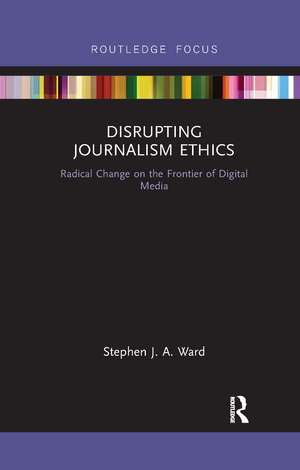Disrupting Journalism Ethics: Radical Change on the Frontier of Digital Media: Disruptions
Autor Stephen J A Warden Limba Engleză Paperback – 30 sep 2021
As a philosophical pragmatist, Stephen J. A. Ward critiques traditional conceptions of accuracy, neutrality, detachment and patriotism, evaluating their capacity to respond to ethical dilemmas for journalists in the 21st century. The book proposes a holistic mindset for doing journalism ethics, a theory of journalism as advocacy for egalitarian democracy, and a global redefinition of basic journalistic norms. The book concludes by outlining the shape of a future journalism ethics, employing these alternative notions.
Disrupting Journalism Ethics is an important intervention into the role of journalism today. It asks: what new role journalists should play in today’s digital media world? And what new mind-set, new aims, and new standards ought jounalists to embrace? The book aims to persuade—and provoke—ethicists, journalists, students, and members of the public to disrupt and invent.
Din seria Disruptions
-
 Preț: 399.85 lei
Preț: 399.85 lei -
 Preț: 386.01 lei
Preț: 386.01 lei -
 Preț: 385.06 lei
Preț: 385.06 lei -
 Preț: 155.43 lei
Preț: 155.43 lei -
 Preț: 378.70 lei
Preț: 378.70 lei -
 Preț: 384.26 lei
Preț: 384.26 lei -
 Preț: 384.67 lei
Preț: 384.67 lei -
 Preț: 385.00 lei
Preț: 385.00 lei -
 Preț: 155.43 lei
Preț: 155.43 lei -
 Preț: 155.43 lei
Preț: 155.43 lei -
 Preț: 354.68 lei
Preț: 354.68 lei -
 Preț: 356.10 lei
Preț: 356.10 lei -
 Preț: 354.72 lei
Preț: 354.72 lei -
 Preț: 354.72 lei
Preț: 354.72 lei -
 Preț: 461.66 lei
Preț: 461.66 lei - 27%
 Preț: 842.49 lei
Preț: 842.49 lei -
 Preț: 462.04 lei
Preț: 462.04 lei -
 Preț: 407.87 lei
Preț: 407.87 lei - 15%
 Preț: 461.30 lei
Preț: 461.30 lei -
 Preț: 462.43 lei
Preț: 462.43 lei - 13%
 Preț: 334.64 lei
Preț: 334.64 lei - 23%
 Preț: 326.11 lei
Preț: 326.11 lei -
 Preț: 385.00 lei
Preț: 385.00 lei -
 Preț: 384.86 lei
Preț: 384.86 lei -
 Preț: 407.70 lei
Preț: 407.70 lei - 27%
 Preț: 922.82 lei
Preț: 922.82 lei - 15%
 Preț: 456.96 lei
Preț: 456.96 lei -
 Preț: 456.06 lei
Preț: 456.06 lei - 27%
 Preț: 966.61 lei
Preț: 966.61 lei -
 Preț: 480.39 lei
Preț: 480.39 lei -
 Preț: 385.73 lei
Preț: 385.73 lei -
 Preț: 386.77 lei
Preț: 386.77 lei -
 Preț: 404.00 lei
Preț: 404.00 lei -
 Preț: 322.44 lei
Preț: 322.44 lei - 15%
 Preț: 464.97 lei
Preț: 464.97 lei - 23%
 Preț: 320.36 lei
Preț: 320.36 lei -
 Preț: 384.32 lei
Preț: 384.32 lei -
 Preț: 409.61 lei
Preț: 409.61 lei - 15%
 Preț: 420.64 lei
Preț: 420.64 lei -
 Preț: 461.08 lei
Preț: 461.08 lei -
 Preț: 359.03 lei
Preț: 359.03 lei - 15%
 Preț: 422.72 lei
Preț: 422.72 lei -
 Preț: 175.88 lei
Preț: 175.88 lei - 13%
 Preț: 337.64 lei
Preț: 337.64 lei - 27%
 Preț: 1087.45 lei
Preț: 1087.45 lei
Preț: 155.43 lei
Nou
Puncte Express: 233
Preț estimativ în valută:
29.74€ • 30.87$ • 24.86£
29.74€ • 30.87$ • 24.86£
Carte tipărită la comandă
Livrare economică 17-31 martie
Preluare comenzi: 021 569.72.76
Specificații
ISBN-13: 9781032178585
ISBN-10: 1032178582
Pagini: 116
Dimensiuni: 138 x 216 x 15 mm
Greutate: 0.45 kg
Ediția:1
Editura: Taylor & Francis
Colecția Routledge
Seria Disruptions
Locul publicării:Oxford, United Kingdom
ISBN-10: 1032178582
Pagini: 116
Dimensiuni: 138 x 216 x 15 mm
Greutate: 0.45 kg
Ediția:1
Editura: Taylor & Francis
Colecția Routledge
Seria Disruptions
Locul publicării:Oxford, United Kingdom
Public țintă
PostgraduateCuprins
Chapter 1: Why Disrupt? Chapter 2: Disrupt dualisms – holism Chapter 3: Disrupt detachment – engagement Chapter 4: Disrupt patriotism – globalism Chapter 5: Disrupt the public sphere – detox Chapter 6: Shape of a future ethic
Notă biografică
Stephen J. A. Ward is an internationally recognized media ethicist, author, and educator. He is Distinguished Lecturer in Ethics at the University of British Columbia, founding director of the Center for Journalism Ethics at the University of Wisconsin, USA and former director of the Graduate School of Journalism at the University of British Columbia. He was a war correspondent, foreign reporter and newsroom manager for 14 years, and has received a lifetime award for service to professional journalism in Canada. Ward is the author of nine books on journalism and media ethics, including The Invention of Journalism Ethics (2006) and the award-winning Radical Media Ethics (2015).
Recenzii
"In the age of big data, disinformation and demagoguery the need for democratically engaged, ethically committed journalists is clear and urgent. With the disruption of long-held journalistic models and practices, comes the need to think about journalism ethics in new and innovative ways. This book rises to the challenge by proposing ways for journalists to move beyond glib claims to facticity and objectivity toward more holistic, open and honest ways to contribute to the goal of human flourishing. Persuasively argued, rooted in careful philosophical reflection and global in its outlook, Disrupting Journalism Ethics is an important addition to current debates about the roles and responsibilities of journalism in a rapidly changing media environment."
Herman Wasserman, Professor of Media Studies, University of Cape Town, South Africa
Herman Wasserman, Professor of Media Studies, University of Cape Town, South Africa
Descriere
Disrupting Journalism Ethics sets out to disrupt and change how we think about journalism and its ethics. The book contends that long-established ways of thinking, which have come down to us from the history of journalism, need radical conceptual reform, with alternate conceptions of the role of journalism and fresh principles to evaluate
